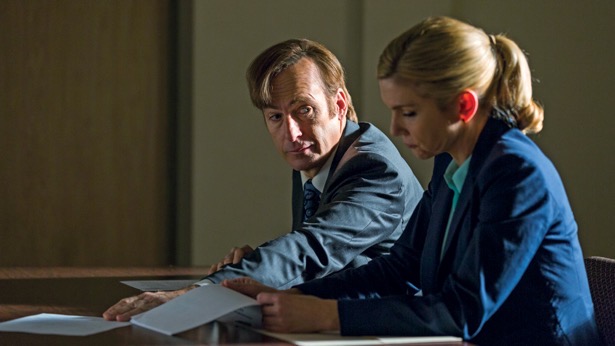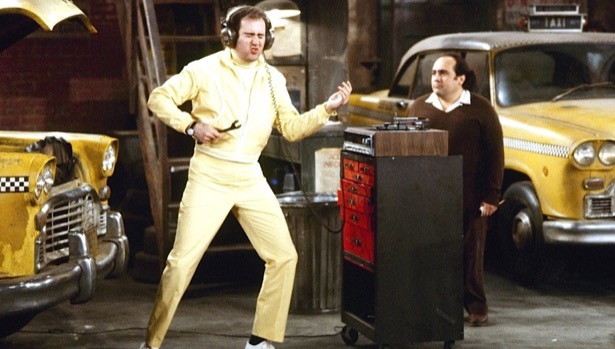I’m a deeply committed fan of Better Call Saul, to the extent that after each episode I listen, hungrily, to the Better Call Saul Insider Podcast. I am endlessly fascinated to learn about the enormously complex, deeply intelligent, technically sophisticated, emotionally sensitive collaborative energy that goes into making a show like this. Every time I listen I discover something about the show that I had missed, something that makes its already-powerful story even more powerful.
It’s also fun to hear how closely the actors (there’s usually, though not always, one each episode) identify with their characters, in ways that reveal them, the actors, as often insightful and sometimes unreliable. When Michael Mando explains how he sees Nacho as motivated largely by shame — shame before his honorable father — I immediately see the truth of it. When Bob Odenkirk defends Jimmy’s indefensible actions, I just shake my head in disbelief. By far the most interesting of the actors on the podcast, though, is Rhea Seehorn, who is extremely articulate in analyzing Kim but insightful into other characters as well.
In sum: the podcast is a great supplement to the show.
What follows is super-spoilery.
In a vital scene in the just-released final episode of Season 4, Jimmy McGill breaks down weeping in his car. When that scene was discussed on the podcast, I was struck by the number of participants who believe that he was finally weeping for his dead brother Chuck. No, he definitely wasn’t.
Many of the people on the podcast, regulars and guests, believe that Jimmy is in the denial stage of grief, or something like that. On the show itself, Kim seems to think the same — you can’t be sure because neither Kim nor Jimmy tends to speak what they feel — but I believe that it’s her sense that Jimmy hasn’t processed Chuck’s death that prompts her to press him to seek counseling. But when, briefly, he says he will, it’s not because of Chuck: it’s because he got mugged by some punks when trying to run a scam and he’s concerned that he’s still acting like he’s 20 years old.
In my judgment Jimmy has never grieved Chuck’s death and never will. The last words Chuck said to him were, “The truth is, you’ve never mattered all that much to me.” And I believe that from that moment on Chuck was completely dead to Jimmy already.
So why does he cry in his car?
In the previous scene, Jimmy has sat in a conference room with a bunch of other lawyers interviewing high school students who have applied for a scholarship. Jimmy argues on behalf of a girl who had been convicted of shoplifting when younger but has put her life together; he says that at least one of their scholarships (there are three to distribute) should go to someone who isn’t perfect, who has made mistakes and triumphed over them. But that argument falls on deaf ears, and after the decision is made Jimmy catches up with the girl and gives her an impassioned speech explaining that people like her never get a fair shake and never will, and that she has to be bold, has to cut corners, has to do everything she can, no matter how ruthless, to maneuver around those people. So what, Jimmy says, if they’re sitting there on the 35th floor judging you? You don’t care because you’re gonna be on the 50th floor looking down at them.
And then he goes back to his car. His old, beat-up car, with a mismatched door, the same one he’s had since we first saw him. And, as is often the case, it won’t start. And that’s when he starts crying.
This episode begins with a flashback to Jimmy and Chuck, right after Jimmy is sworn in as a lawyer, going to a karaoke bar with friends and singing Abba’s “Winner Takes It All.” And Jimmy actually quotes that song to the girl who didn’t get the scholarship. (He doesn’t say, but he means, this line: “But I was a fool / Playing by the rules.”) The song tells us that the winner takes it all, but is also tells us that “the loser has to fall.” And what Jimmy is facing at this moment is, simply: he’s a loser. As Kim told him in a previous eposode, when he complained that she was “kicking a man when he’s down,” “Jimmy, you’re always down.” He’s not on the 50th floor looking down on anyone. He’s sitting in an old beater that won’t start, because that’s all he can afford. The loser has to fall, and does.
And I think this is the point of no return for Jimmy — the point at which it’s absolutely inevitable that he’ll become Saul Goodman, unscrupulous, lying, deceitful, dishonest, crooked as crooked can be. Because he tried, at least sometimes, playing by the rules and the result is, he’s always down. I don’t think he’ll play by the rules any more.
At the end of the episode and the season, Jimmy has just regained his law license — by faking sincerity more skillfully than he had faked it before —, and we learn that he’s not going to practice under his own name but under the name Saul Goodman. The key point is that Kim learns it at the same moment that we do. He hasn’t told her. He has shut her out, just as he had earlier shut out Chuck, though for far less reason, since Kim has been far better to him than he ever deserved. Kim now sees that there is nothing fully human behind the mask. I don’t see how she can ever trust him again.













